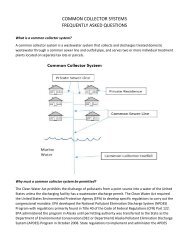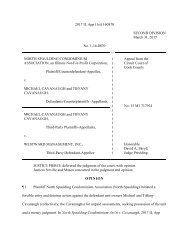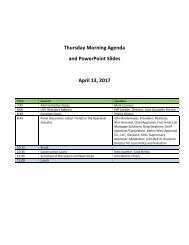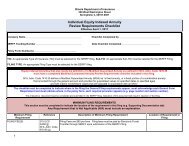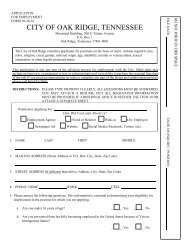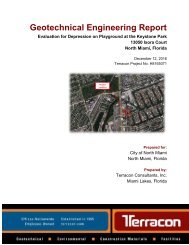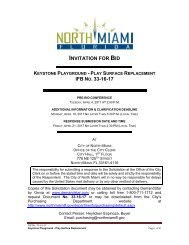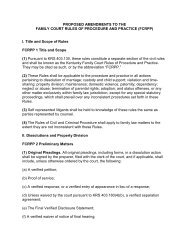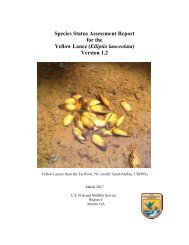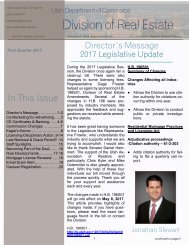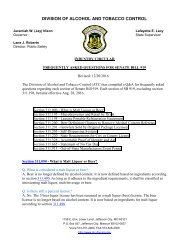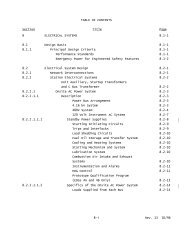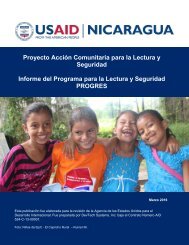READING COMPETITION GUIDE
PA00MB14
PA00MB14
Create successful ePaper yourself
Turn your PDF publications into a flip-book with our unique Google optimized e-Paper software.
<strong>READING</strong> <strong>COMPETITION</strong><br />
<strong>GUIDE</strong><br />
APRIL 2016<br />
Contract No.: AID-612-C-13-00002<br />
This guide was prepared for review by the United States Agency for International Development.
Reading Competition Guide<br />
Picture of the first ever EGRA Zonal Reading Competition held in Ntcheu, Kapalamula Zone, led by Traditional Authority Ganya<br />
representative, Group Village Head Chiluzi. Photo: Dezie Trigu<br />
Submitted under<br />
Contract No.: AID-612-C-13-00002<br />
by<br />
RTI International<br />
3040 Cornwallis Road<br />
Post Office Box 12194<br />
Research Triangle Park, NC 27709-2194<br />
Date Submitted: April 2016
Malawi EGRA<br />
Reading Competition Guide<br />
Table of Contents<br />
List of Figures ......................................................................................................................... iv<br />
List of Tables ........................................................................................................................... iv<br />
Abbreviations ........................................................................................................................... v<br />
Introduction ............................................................................................................................. 1<br />
What Is a Reading Competition? ......................................................................................... 1<br />
What Is the Purpose of the Reading Competition Guide? ................................................... 1<br />
Competition Approach and Organization ................................................................................ 1<br />
Objectives ............................................................................................................................... 2<br />
Outcomes ................................................................................................................................ 2<br />
Item Writing ............................................................................................................................. 3<br />
Format of the Reading Competitions ...................................................................................... 3<br />
Cluster Level ....................................................................................................................... 3<br />
Zonal Level .......................................................................................................................... 3<br />
District Level ........................................................................................................................ 4<br />
Notes on the Reading Competitions ....................................................................................... 4<br />
Prize Categories .................................................................................................................. 5<br />
Competition Categories ....................................................................................................... 5<br />
Reading Skills Tests ............................................................................................................ 6<br />
Alphabetic Principle (total possible score: 20 points) ...................................................... 6<br />
Vocabulary (total possible score: 20 points) .................................................................... 6<br />
Reading Fluency (total possible score: 30 points) ........................................................... 7<br />
Comprehension (total possible score: 30 points) ............................................................ 8<br />
Judges’ Code of Ethics ........................................................................................................... 9<br />
Appendix I: Score Sheets ..................................................................................................... 10<br />
Appendix II: Reading Competition Report Format ................................................................ 18<br />
Appendix III: Sample Competition Questions ....................................................................... 20<br />
Appendix IV: EGRA Reading Committee Members .............................................................. 27<br />
Appendix V: Prizes (EGRA Starter Packs) ........................................................................... 28<br />
Malawi Early Grade Reading Activity Reading Competition Guide<br />
iii
Malawi EGRA<br />
Reading Competition Guide<br />
List of Figures<br />
Figure 1. Flow of the Reading Competition ............................................................................. 2<br />
List of Tables<br />
Table 1. Prize Categories ....................................................................................................... 5<br />
iv<br />
Malawi Early Grade Reading Activity Reading Competition Guide
Malawi EGRA<br />
Reading Competition Guide<br />
Abbreviations<br />
CDA<br />
DCDO<br />
DCM<br />
DEM<br />
DIAS<br />
DTED<br />
EGRA<br />
MGCDSW<br />
MoEST<br />
PEA<br />
PTA<br />
SMC<br />
USAID<br />
VCRF<br />
Community Development Assistant<br />
District Community Development Officer<br />
District Community Mobilizer<br />
District Education Manager<br />
Department of Inspection and Advisory Services<br />
Department of Teacher Education and Development<br />
Early Grade Reading Activity<br />
Ministry of Gender, Children, Disability and Social Welfare<br />
Ministry of Education Science and Technology<br />
Primary Education Advisor<br />
Parent-teacher association<br />
School Management Committee<br />
US Agency for International Development<br />
Volunteer Community Reading Facilitator<br />
Malawi Early Grade Reading Activity Reading Competition Guide<br />
v
Malawi EGRA<br />
Reading Competition Guide<br />
Introduction<br />
What Is a Reading Competition?<br />
The Malawi Early Grade Reading Activity (EGRA) encouraged participating schools<br />
to hold reading competitions, similar to school sports competitions, among learners in<br />
Standards 1–3. A reading competition is a celebratory event that recognizes and<br />
rewards the academic achievements of Standard 1–3 learners, teachers, schools,<br />
and zones. Learners compete in events designed to test their reading skills, both for<br />
themselves and for the schools and communities that they represent. The<br />
competitions include challenges to determine learners’ knowledge of letter sounds, or<br />
the alphabetic principle, learners’ vocabulary, their reading fluency, and their<br />
comprehension of what they have read. These reading competitions foster the spirit<br />
of academic achievement, good sportsmanship, community involvement, and social<br />
inclusion. They also showcase the great strides in reading the learners have made.<br />
What Is the Purpose of the Reading Competition Guide?<br />
This Reading Competition Guide provides some general information on reasons for<br />
holding the reading competitions and the resources needed to hold and organize<br />
them at cluster, zonal, and district levels. The Guide, among other things, offers an<br />
approach to the organization and format of the competitions—what skills to test at<br />
each grade level and how to assess them, and how to choose winners at each grade<br />
and competition level. It also explains the objectives of the competitions and the<br />
expected outcomes.<br />
Competition Approach and Organization<br />
All 11 educational districts where EGRA was implemented conducted cluster, zonal,<br />
and district-level reading competitions in the 2015–2016 school year. Reading<br />
competitions are held in addition to the reading fairs that the schools conduct; they<br />
are not taking the place of the reading fairs. Like the reading fairs, the reading<br />
competitions promote the culture of learning in the broader school community. The<br />
competitions are organized by Primary Education Advisors (PEAs), Community<br />
Development Assistants (CDAs), head teachers, and teachers 1 and follow a cascade<br />
model that starts at cluster level, then proceeds to zonal level, then culminates in a<br />
district-level competition (Figure 1). At each level, winning learners, teachers, and<br />
schools are awarded prizes. At cluster and zonal levels EGRA provides starter-pack<br />
prizes to augment the prizes offered by the schools and communities (see Appendix<br />
V). At the district level, schools represent their zones. Winning zones receive trophies<br />
to keep until the next round of competition.<br />
At cluster and zonal levels School Management Committees (SMCs) and parent–<br />
teacher associations (PTAs) are mobilized to continue supporting and facilitating the<br />
planning and preparation for these reading competitions. Just as they do for schools’<br />
regular reading fairs, SMCs and PTAs raise funds for prizes and other costs of the<br />
reading competitions. During EGRA’s tenure, clusters, zones, and districts are<br />
required to write a competition report following the reporting template (see Appendix<br />
II) and submit it to EGRA district personnel.<br />
Competition categories focus on four out of the five main reading skills: alphabetic<br />
principle or letter recognition, vocabulary, fluency, and comprehension (a general<br />
1<br />
The reading competitions are coordinated by the Ministry of Gender, Children, Disability and Social Welfare<br />
(MGCDSW), CDAs, and the Ministry of Education, Science and Technology (MoEST) PEAs. EGRA district<br />
ccommunity personnel provide technical and planning assistance.<br />
Malawi Early Grade Reading Activity Reading Competition Guide 1
Malawi EGRA<br />
Reading Competition Guide<br />
description of competition categories can be found below). Reading competitions do<br />
not assess the skill of phonological awareness because its focus is a pre-reading<br />
skill. For the 2015–2016 school year, reading competitions are held in Chichewa<br />
only.<br />
Figure 1. Flow of the Reading Competition<br />
District<br />
Competition<br />
Zonal<br />
Competition<br />
Zonal<br />
Competition<br />
Cluster<br />
Competition<br />
Cluster<br />
Competition<br />
Cluster<br />
Competition<br />
Cluster<br />
Competition<br />
Objectives<br />
The reading competition has the following objectives:<br />
Outcomes<br />
• Celebrate learner, school, and zone reading achievements.<br />
• Recognize and reward the academic achievements of Standard 1–3 learners,<br />
schools, and zones.<br />
• Foster a model of academic achievement, good sportsmanship, community<br />
involvement, and social inclusion.<br />
• Educate the public about the importance of sending children to school and<br />
encouraging them to read at home.<br />
• Raise societal expectations for learners who are disadvantaged to succeed<br />
socially and academically.<br />
• Inspire learners to stay in school and reach their full potential.<br />
Reading competition events are expected to have the following outcomes:<br />
• The importance of literacy for children is publicly promoted.<br />
• Learners are encouraged to stay in school and enhance their chances of<br />
proceeding to secondary school and of attaining tertiary education.<br />
2 Malawi Early Grade Reading Activity Reading Competition Guide
Malawi EGRA<br />
Reading Competition Guide<br />
Item Writing<br />
• Teachers, families, and communities have raised expectations for learners’<br />
success.<br />
• Community ownership of the EGRA goals and literacy objectives is fostered,<br />
• Sustainability of EGRA achievements and successes is promoted in schools,<br />
communities, and MoEST at large.<br />
• Coordination and cooperation amongst teachers, schools, and communities is<br />
increased.<br />
Each cluster, zone, and district sets a representative committee of six item writers<br />
(who are well versed in EGRA teaching methods and goals) who are responsible for<br />
setting the test items two weeks before the competition using the examples that have<br />
been provided in this Guide (see Appendix III). It is important that three of the team<br />
members are male and the other three female.<br />
Format of the Reading Competitions<br />
Cluster Level<br />
The first level of the reading competition will be the cluster level. All schools in a<br />
cluster compete, and each school sends 2 contestants, 1 boy and 1 girl, from each of<br />
Standards 1–3. The total number of cluster contestants will depend on the number of<br />
schools in each cluster, but is expected to be between 18 (9 boys and 9 girls) and 32<br />
(16 boys and 16 girls).<br />
To determine which learners it sends to the cluster competition, each school<br />
administers 4 Chichewa reading skills tests to learners in each of Standards 1–3. To<br />
ensure gender balance, the boy and the girl with the highest cumulative score on<br />
those tests are chosen to attend the cluster level competition for each of Standards<br />
1–3. This means that each school sends a total of 6 learners to the cluster level<br />
competition.<br />
At the cluster level competition, learners again take 4 Chichewa reading skills tests.<br />
Competition adjudicators (judges) identify 2 learners (1 boy and 1 girl) from each of<br />
Standards 1–3 who excel in reading Chichewa, again based on their cumulative<br />
scores on the 4 Chichewa reading skills contests. Those chosen go on to compete at<br />
the zonal level.<br />
At the cluster level competition, the strongest learners for each standard are given<br />
prizes arranged for and provided by the schools and communities themselves.<br />
(EGRA will provide starter packs as indicated in Appendix V.)<br />
Zonal Level<br />
The next level of the reading competition is the zonal level competition. Each cluster<br />
sends a total of 6 learners to the zonal level competition: 1 boy and 1 girl from each<br />
of Standards 1–3. The learners chosen for the zonal level are those who achieved<br />
the highest cumulative scores on the 4 Chichewa reading skills tests in the cluster<br />
level competition. The total number of zonal contestants will depend on the number<br />
of clusters in a zone; it is expected to be between 18 (9 boys and 9 girls) and 30 (15<br />
boys and 15 girls).<br />
Malawi Early Grade Reading Activity Reading Competition Guide 3
Malawi EGRA<br />
Reading Competition Guide<br />
Zonal competition contestants compete in the same categories of Chichewa reading<br />
skills tested at the cluster level, though the zonal tests use different reading<br />
materials.<br />
Learners who achieve the highest cumulative scores move on to the district level<br />
competition.<br />
As they do at the cluster level, learners who achieve positions 1 through 3 in each of<br />
Standards 1–3 receive prizes as determined by the zones (EGRA will provide starter<br />
packs, as indicated in Appendix V). Schools that have the most learners who excel<br />
are also awarded prizes, as determined by the zone.<br />
The funds for organizing the cluster and zonal level competitions and purchasing the<br />
prizes can be raised in several ways, as suggested below:<br />
• Ask for financial or material assistance from the schools’ alumni<br />
• Approach the councilor or Member of Parliament for the zone for assistance<br />
• Appeal to local business people from the area for financial and material<br />
assistance<br />
• Ask village headmen and communities to assist with any locally found items,<br />
as they already do during reading fairs<br />
• Hold various income generating activities, like jumble sales or local drama<br />
performances<br />
District Level<br />
The highest level of the reading competition is the district level. Each zone sends to<br />
the district level competition 4 contestants: the strongest Standard 1 learner (choose<br />
between the strongest boy or strongest girl), the strongest Standard 2 learner<br />
(choose between the strongest boy or strongest girl), and the strongest Standard 3<br />
learner (choose between the strongest boy or strongest girl) based on the highest<br />
cumulative Chichewa scores at the zonal level. The fourth contestant should be the<br />
second best Standard 1 learner (choose a boy or a girl depending on which gender<br />
needs equal representation).<br />
The number of district contestants varies according to the number of zones that each<br />
district has, but should be between 36 (18 boys and 18 girls) and 60 (30 boys and 30<br />
girls) contestants.<br />
District level competition contestants compete in the same categories of reading<br />
skills tested at the zonal level, though the district level tests use different reading<br />
materials.<br />
Learners who achieve the highest cumulative scores at each of Standards 1–3 are<br />
awarded prizes (see Appendix V).<br />
The strongest zones and schools are also awarded prizes based on the number of<br />
winning learners at the district level competition.<br />
Notes on the Reading Competitions<br />
• Cluster and zonal level competitions will be opportunities to recognize<br />
Volunteer Community Reading Facilitators (VCRFs), teachers, supportive<br />
village heads, PTAs, SMCs, and Mother Groups. The recognition can be<br />
mere public mention of their hard work, or some type of prize may be<br />
awarded as organized by the organizing committee.<br />
4 Malawi Early Grade Reading Activity Reading Competition Guide
Malawi EGRA<br />
Reading Competition Guide<br />
• Special needs education learners should be included and recognized in the<br />
activities wherever possible so that they are motivated to learn and the<br />
community is encouraged to practice inclusiveness. Those who can ably<br />
compete should be given more time (20 percent additional time added to the<br />
regular time), or the opportunity to read in braille or large print (for the visually<br />
impaired), or a sign language interpreter (for those with hearing impairment).<br />
• Members of the audience should be given a few copies of the competition<br />
materials to share as each text is read so that they can follow along as the<br />
children compete. The best practice will be for the assessing committee to<br />
display what the contestants are reading on a raised board. It would be best<br />
to have a public address system in place for each competition.<br />
• Parents and communities should be mobilized to ensure that they attend and<br />
participate. This mobilization should be done by all stakeholders, including<br />
PEAs; CDAs; head teachers; SMC, PTA, and Mother Group members; group<br />
village heads; traditional authorities; and churches, counselors, and church<br />
leaders.<br />
• Start reading competitions on time. Delays will work against the competitors<br />
as the day goes on, and they have no opportunities to take a break or eat.<br />
Spectators may also prefer shorter events. Where possible, after the closing<br />
speech a football or netball match between two schools can be organized.<br />
• Stakeholders who served as EGRA Reading Committee members (see<br />
Appendix IV) can serve as a resource for any further questions regarding<br />
developing the reading competitions.<br />
Prize Categories<br />
Prizes to be awarded at each level of the reading competition are shown in Table 1.<br />
Table 1. Prize Categories<br />
Cluster Level Zonal Level District Level<br />
Category Positions Category Positions Category Positions<br />
Strongest Learner<br />
(one boy and one girl<br />
each standard )<br />
1–3 Strongest Learner<br />
(one boy and one girl<br />
each standard )<br />
1–3 Strongest Learner<br />
(one boy and one girl<br />
each standard )<br />
Strongest School 1–3 Strongest School 1–3 Strongest School 1–3<br />
1–3<br />
Strongest Cluster 1–3 Strongest Zone 1–3<br />
Competition Categories<br />
To standardize and level the playing field, contestants compete in four categories to<br />
test their reading skills.* More categories give more learners the opportunity to<br />
demonstrate their prowess. Note that for each category, extra materials or questions<br />
should be prepared and ready for use in the case of a tie among contestants.<br />
(Appendix III provides some examples for use in developing competition materials.)<br />
The four categories are:<br />
1. Alphabetic Principle<br />
2. Vocabulary knowledge<br />
Malawi Early Grade Reading Activity Reading Competition Guide 5
Malawi EGRA<br />
Reading Competition Guide<br />
3. Fluency<br />
4. Comprehension<br />
*Phonological awareness, the fifth major reading skill, is not tested because of its focus on<br />
pre-reading skills.<br />
Reading Skills Tests<br />
Alphabetic Principle (total possible score: 20 points)<br />
Alphabetic principle tasks measure contestants’ ability to associate sounds with<br />
letters and to use those sounds to read and spell words. Learners who possess this<br />
skill can hear the sound of the letter “k” and write down the correct letter, or can read<br />
a word they have not encountered before by sounding it out. For example, learners<br />
hear the sound /k/ and write down the letter “k” or are able to read a new word by<br />
sounding it out (such as reading /kwa/ /wa/ and making kwawa). In other words, the<br />
learners have the ability to associate sounds with letters and to use that knowledge<br />
to read and spell the words.<br />
This reading skills test has two separate activities: writing (spelling), and making<br />
words from mixed up letters. All learners in each standard participate together in<br />
each activity; they do not have to be tested individually. The activities are done<br />
together, one after the other.<br />
In the writing activity, the judges say out loud letter sounds that constitute a particular<br />
word, while learners write the letters that the judges say to make the word.<br />
Then the judges give the contestants jumbled written letters from which to make a<br />
known word. (Note: The jumbled words will be different from the spelled words, and<br />
the duration of the test will be 10 minutes.) For instance, judges could give the letters<br />
wwkaa, and contestants would form the word kwawa.<br />
Learners in different standards are assessed using different items suitable for their<br />
level. Assessment items should come from learners’ books and the work that is<br />
supposed to have been covered in the term(s) prior to the date of the competition:<br />
• Cluster level: Should test on content that is supposed to be covered in Term<br />
1.<br />
• Zonal level: Should test on content that is supposed to be covered in Terms1<br />
and 2.<br />
• District level: Should test on content that is supposed to be covered in Terms<br />
1, 2, and 3.<br />
Scoring<br />
The judges will score each contestant on a total of 20 points. Contestants will be<br />
scored according to the number of the 5 words that they have spelled correctly and<br />
the number of words they have written correctly from each of the 5 sets of jumbled<br />
letters. Each correct item is worth 2 points; incorrect items are worth 0 points.<br />
Vocabulary (total possible score: 20 points)<br />
Vocabulary tasks measure contestants’ knowledge of the words and their meanings,<br />
and how to use that knowledge to read more fluently.<br />
Contestants are tested on vocabulary individually, using words appropriate for the<br />
standard level. Each contestant in this category will be given 5 written words worth 4<br />
points each. The contestants are asked to orally make a full sentence for each of the<br />
5 words.<br />
6 Malawi Early Grade Reading Activity Reading Competition Guide
Malawi EGRA<br />
Reading Competition Guide<br />
Scoring<br />
The judges will score each contestant against a possible total of 20 points for<br />
creating clear, complete sentences with the correct meaning of the words. Scoring<br />
will be as follows:<br />
• Grammatically correct full sentence that shows understanding of the meaning<br />
of the word (4 points). Example: Khasu<br />
Atate anga amagwiritsa ntchito khasu polima kumunda (4 points)<br />
• Grammatically correct full sentence with limited explanation of the word (3<br />
points):<br />
Atate anga atenga khasu (3 points)<br />
Reading Fluency (total possible score: 30 points)<br />
The reading fluency task measures contestants’ ability to read accurately, quickly,<br />
and with expression. It determines whether contestants are able to identify common<br />
words rapidly and whether they can use decoding skills to read sentences.<br />
Contestants are asked to read aloud, individually, and in 2 minutes, a selected text<br />
(story or article) before a panel of judges. Each contestant reads and answers<br />
questions on the same text: the text used for reading fluency is also used for the<br />
comprehension task afterwards. This means that each contestant will first be<br />
tested in reading fluency, and then in comprehension right afterward. Please take<br />
care to ensure that contestants cannot overhear prior contestants. Make sure these<br />
tests are conducted in a secure manner.<br />
The texts for each standard are as follows:<br />
Standard 1 learners<br />
• Cluster level: 15–20 word story<br />
• Zonal level: 25–40 word story<br />
• District level: 45–50 word story<br />
Standard 2 learners<br />
• at cluster, zonal, and district levels: 85–100 word story<br />
Standard 3 learners<br />
• at cluster, zonal, and district levels: 150–200 word story<br />
Notes on reading fluency texts: Like all the text items, texts used in the reading<br />
fluency and comprehensions skills tests should be written ahead of the competition<br />
and geared toward the particular standard and level of the tests, with the appropriate<br />
word count. The competition item writers should develop and trial test different<br />
reading passages for each standard at two different schools and on two different<br />
learners (one girl and one boy) per each standard at each school before the date of<br />
the competition. Reading competition judges will need three different reading<br />
passages for each standard on the day of the competition.<br />
The texts should include words that demand reading with expression so that the<br />
learners can demonstrate expressive reading.<br />
The fonts used for the texts should mirror those used in the learners’ books for the<br />
standard—that is, larger fonts for Standards 1–2.<br />
Malawi Early Grade Reading Activity Reading Competition Guide 7
Malawi EGRA<br />
Reading Competition Guide<br />
On the day of the competition, the judges should merge and edit some parts of the 3<br />
prepared passages for each standard into 2 passages and ensure that the word limit<br />
is maintained. Judges choose 1 of these 2 to be used in the skills tests, and the other<br />
one will be held in case it is needed as tie-breaker text.<br />
Judges should merge and edit the texts to avoid any opportunities for cheating.<br />
Reading time: The suggested reading time for the reading fluency skills test is 2<br />
minutes per contestant; this test should be timed. Learners may take less than 2<br />
minutes.<br />
Scoring<br />
The judges will score each reading on a scale of 1 to 5 (with 5 the highest score)<br />
using different attributes that show the quality of reading, such as correct<br />
pronunciation, smooth reading that obeys punctuation, etc. (see Appendix I for the<br />
scoring sheet for Reading Fluency). The contestants are expected to demonstrate<br />
that they have a strong understanding of the overall context of the story or article<br />
they are reading.<br />
Comprehension (total possible score: 30 points)<br />
Comprehension tasks measure learners’ ability to derive meaning from printed text.<br />
Contestants demonstrate whether they are able to answer questions about the text<br />
they have read or not.<br />
Judges ask the contestants questions about a reading text they have just read. Each<br />
contestant reads and answers questions about the same text; be sure competitors<br />
cannot overhear other contestants’ responses. Contestants in Standard 3 should be<br />
grouped together and can answer the questions in writing.<br />
Contestants are asked to answer 6 questions about the text to test their<br />
comprehension of the story.<br />
The style of the question and response session will vary, depending on standard and<br />
level, as follows.<br />
Cluster<br />
Zonal<br />
• Standard 1: Answer comprehension questions orally while referring to the<br />
passage.<br />
• Standard 2: Answer comprehension questions orally while referring to the<br />
passage<br />
• Standard 3: Contestants are gathered in a room to answer comprehension<br />
questions in writing while looking at the passage.<br />
• Standard 1: Answer comprehension questions orally while referring to the<br />
passage<br />
• Standard 2: Answer comprehension questions in writing while looking at<br />
passage<br />
• Standard 3: Contestants are gathered in a room to answer comprehension<br />
questions in writing while looking at the passage.<br />
District<br />
• Standard 1: Answer comprehension questions orally<br />
• Standard 2: Contestants are gathered in a room to answer comprehension<br />
questions in writing while looking at the passage.<br />
8 Malawi Early Grade Reading Activity Reading Competition Guide
Malawi EGRA<br />
Reading Competition Guide<br />
• Standard 3: Contestants are gathered in a room to answer comprehension<br />
questions in writing while looking at the passage.<br />
An inferential question should be included at each level (that is, a question for which<br />
the answer cannot be directly found in the text or passage). To answer inferential<br />
questions, learners have to use thinking skills to make meaning from what they have<br />
read; there may be a range of possible answers to an inferential question.<br />
Scoring<br />
The judges will score each response on a scale of 1 to 5 (with 5 the highest score)<br />
according to the learner’s understanding of the text and personal style/technique (see<br />
the scoring table). The contestants are expected to demonstrate that they have a<br />
strong understanding of the overall context of the story or article they read.<br />
The scoring guidelines are as follows:<br />
• Gives the correct answer in a grammatically correct full sentence: 5 points<br />
• Gives the correct answer in a full sentence, but ungrammatical : 4 points<br />
• Gives the correct answer but in phrase form: 3 points<br />
• Gives the correct answer but in one word: 2 points<br />
Judges’ Code of Ethics<br />
Each cluster, zone, and district appoins five judges. The gender of the judges should<br />
be mixed, and two judges should be on reserve in case of emergencies that may<br />
arise as the competition is in progress. These judges should consciously avoid bias<br />
of any kind in selecting the first, second, and third place learners. They may not<br />
consider the contestants’ area, community, school, cluster, zone, or any affiliation,<br />
nor may they consider any contestant's age, sex, race, creed, learning ability (for<br />
example, deaf, blind, and partially sighted learners or learners with other disabilities),<br />
national origin, or political beliefs when selecting contest winners. They will<br />
demonstrate the utmost objectivity. Judges must refrain from public criticism and<br />
abide by the contest rules and judging standards, which impose strict confidentiality<br />
regarding competition materials and scores, and ensure that contestants are ranked<br />
in accordance with official policy as herein enshrined.<br />
Malawi Early Grade Reading Activity Reading Competition Guide 9
Malawi EGRA<br />
Reading Competition Guide<br />
Appendix I: Score Sheets<br />
Alphabetic Principle<br />
District Name:<br />
Name of Learner School Cluster Zone<br />
Alphabetic Principle Score Sheet – (Maximum score is 20 points)<br />
Total Score:<br />
Rating<br />
(maximum two points each)<br />
Total<br />
Sound spelling word # 1 2 3 4 5<br />
Score<br />
Sub Total :<br />
Score Justification:<br />
Jumbled word writing # 1 2 3 4 5<br />
Score<br />
Sub Total<br />
Score Justification:<br />
Judge Name:<br />
Judge Signature:<br />
Date:<br />
10 Malawi Early Grade Reading Activity Reading Competition Guide
Malawi EGRA<br />
Reading Competition Guide<br />
Vocabulary Knowledge<br />
District Name:<br />
Name of Learner School Cluster Zone<br />
Vocabulary Knowledge Score Sheet – (Maximum score is 20 points)<br />
Total Score:<br />
Rating<br />
Total<br />
Question # 1 2 3 4 5<br />
Score<br />
Sub Total :<br />
Score Justification:<br />
Judge Name:<br />
Judge Signature:<br />
Date:<br />
Key<br />
a. Grammatically correct full sentence that shows understanding of the meaning<br />
of the word (4 points), e.g., Khasu<br />
Atate anga amagwiritsa ntchito khasu polima m’munda<br />
b. Grammatically correct full sentence with limited explanation of the word (3<br />
points):<br />
Atate anga atenga khasu (3 points)<br />
Malawi Early Grade Reading Activity Reading Competition Guide 11
Malawi EGRA<br />
Reading Competition Guide<br />
Reading Fluency<br />
District Name:<br />
Name of Learner School Cluster Zone<br />
On a scale of 1-5, (1 being the lowest level of performance, and 5 being the<br />
highest) select the number that reflects the learner’s performance of each of the five<br />
criteria listed below.<br />
Reading Fluency Score Sheet – (Maximum score is 30 points)<br />
Total Score:<br />
Clear pronunciation<br />
Rating 1 2 3 4 5 Notes:<br />
Reads passage smoothly<br />
Rating 1 2 3 4 5 Notes:<br />
Appropriate reading speed to enable comprehension<br />
Rating 1 2 3 4 5 Notes:<br />
Conveys a sense of understanding and gives suitable emphasis to the important points<br />
Rating 1 2 3 4 5 Notes:<br />
Reading with accuracy that brings his/her own style, voice, and flavour to the reading and grasps the<br />
appropriate mood<br />
Rating 1 2 3 4 5 Notes:<br />
Obeys punctuation marks<br />
Rating 1 2 3 4 5 Notes:<br />
Sub Total :<br />
Score Justification<br />
Total<br />
Total<br />
Total<br />
Total<br />
Total<br />
Total<br />
12 Malawi Early Grade Reading Activity Reading Competition Guide
Malawi EGRA<br />
Reading Competition Guide<br />
Comprehension<br />
District Name:<br />
Name of Learner School Cluster Zone<br />
Comprehension Score Sheet – (Maximum score is 30 points)<br />
Total Score:<br />
Rating<br />
Total<br />
Question # 1 2 3 4 5 6<br />
Score<br />
Grand Total :<br />
Score Justification:<br />
Judge Name:<br />
Judge Signature:<br />
Date:<br />
Key:<br />
a. Gives the correct answer in a grammatically correct full sentence: 5 points<br />
b. Gives the correct answer in a full sentence but ungrammatical : 4 points<br />
c. Gives the correct answer but in a phrase form: 3 points<br />
d. Gives the correct answer but in one word : 2 points<br />
Malawi Early Grade Reading Activity Reading Competition Guide 13
Malawi EGRA<br />
Reading Competition Guide<br />
Summary Score Sheet<br />
District Name:___________________________<br />
Date:_______________<br />
Contestant Names<br />
Alphabetic<br />
Principle<br />
Vocabulary<br />
Knowledge<br />
Reading<br />
Fluency<br />
Comprehension<br />
Total Score<br />
Judges’ Signature: ___________________ _____________________ ________________<br />
_________________ ____________________ ________________<br />
_________________ ____________________ ________________<br />
14 Malawi Early Grade Reading Activity Reading Competition Guide
Malawi EGRA<br />
Reading Competition Guide<br />
Winners’ Entry Forms<br />
Name of District Zone Cluster<br />
Tick appropriate level:<br />
District Zonal Cluster<br />
Learners<br />
Winners<br />
Standard 1<br />
Position Contestants name Sex School Cluster Zone<br />
1 M<br />
1 F<br />
2 M<br />
2 F<br />
3 M<br />
3 F<br />
Standard 2<br />
Position Contestants name Sex School Cluster Zone<br />
1 M<br />
1 F<br />
2 M<br />
2 F<br />
3 M<br />
3 F<br />
Standard 3<br />
Position Contestants name Sex School Cluster Zone<br />
1 M<br />
1 F<br />
Malawi Early Grade Reading Activity Reading Competition Guide 15
Malawi EGRA<br />
Reading Competition Guide<br />
Position Contestants name Sex School Cluster Zone<br />
2 M<br />
2 F<br />
3 M<br />
3 F<br />
Schools<br />
(Head teachers whose learners have done very well)<br />
Position Head teacher School Zone<br />
# of learners that have<br />
excelled<br />
1<br />
2<br />
3<br />
Clusters<br />
(Clusters whose learners have done very well at zonal level)<br />
Position Cluster # of learners that have excelled<br />
1<br />
2<br />
3<br />
Zones<br />
(Zones whose schools learners have done very well at district level)<br />
Position Zone # of schools that have excelled<br />
1<br />
2<br />
3<br />
Schools<br />
(those with most winning learners—for zonal level only to identify the school<br />
at first, second, and third place in a zone)<br />
Position School Cluster within the zone<br />
1<br />
2<br />
16 Malawi Early Grade Reading Activity Reading Competition Guide
Malawi EGRA<br />
Reading Competition Guide<br />
Position School Cluster within the zone<br />
3<br />
Clusters<br />
(those with most winning learners—for zonal level only to identify the cluster<br />
at first, second, and third place in in a zone).<br />
Position<br />
Cluster<br />
1<br />
2<br />
3<br />
Schools<br />
(those with most winning learners—for district level only)<br />
Position School Cluster Zone<br />
1<br />
2<br />
3<br />
Zones<br />
(for district level competition only)<br />
Position<br />
Zone<br />
1<br />
2<br />
3<br />
Malawi Early Grade Reading Activity Reading Competition Guide 17
Malawi EGRA<br />
Reading Competition Guide<br />
Appendix II: Reading Competition Report Format<br />
(Cluster committee sends report to PEA, and PEA sends to EGRA District Office. For<br />
zonal competition the zonal PEA sends the report to EGRA District Office. For the<br />
district reading competition the DCMs send the report to EGRA Head Office and<br />
keep a copy.)<br />
• Name of Zone where the competition was held<br />
• Name of cluster (in the case of a cluster competition) and in which zone<br />
• Date competition held<br />
• How many schools participated (include names)?<br />
• Names of cluster / zonal/ district reading competition committee members<br />
• Names of judges<br />
• How were resources for the competition mobilized and what was the total<br />
amount and cost of the event? (include who contributed and their contribution)<br />
• Who were the winners (Positions 1, 2, and 3)? What prizes were they given?<br />
(name prize and winner) Which schools were the strongest (Positions 1, 2,<br />
and 3)? What prizes were the schools given? See below:<br />
Learners<br />
Position Contestant name Sex School Cluster Prize given<br />
1 M<br />
1 F<br />
Std 1<br />
Std 2<br />
Std 3<br />
2 M<br />
2 F<br />
3 M<br />
3 F<br />
1 M<br />
1 F<br />
2 M<br />
2 F<br />
3 M<br />
3 F<br />
1 M<br />
1 F<br />
2 M<br />
2 F<br />
3 M<br />
3 F<br />
18 Malawi Early Grade Reading Activity Reading Competition Guide
Malawi EGRA<br />
Reading Competition Guide<br />
Schools<br />
Position School Name Name of Head Teacher Cluster Prize Given<br />
1<br />
2<br />
3<br />
• What roles did school communities play for the competition to take place?<br />
• Successes<br />
• Challenges<br />
• How the challenges were or will be resolved<br />
• Conclusion<br />
• Recommendations<br />
Malawi Early Grade Reading Activity Reading Competition Guide 19
Malawi EGRA<br />
Reading Competition Guide<br />
Appendix III: Sample Competition Questions<br />
(Please, these are samples. Construct your own test items.)<br />
Below are sample competition items<br />
Alphabetic Principle<br />
Standard 1<br />
At Cluster Level<br />
SOUND SPELLING<br />
Instructions: Tsopano ndikutchulirani maliwu ndipo inu muzindilembera<br />
/m/a/dz/i /<br />
/a/n/a<br />
/u/k/a/n/i/<br />
/t/u/ta<br />
/n/a/n/a/z/i/<br />
WRITING (REARRANGING LETTERS)—10 MINUTES<br />
Instructions: Tsopano ndikupatsani zilembo zosakakaniza ndipo inu muzisanje<br />
ndikulemba mau oyenera<br />
zeak zake<br />
ndaoel alendo<br />
klea leka<br />
oinan onani<br />
eatat atate<br />
At Zonal Level<br />
SOUND SPELLING<br />
Instructions: Tsopano ndikutchulirani maliwu ndipo inu muzindilembera<br />
/k/u/m/a/n/a/,<br />
/bw/a/n/a/,<br />
/ w/i/n/a/,<br />
/mp/u/ng/a/<br />
/th/o/le /<br />
WRITING (REARRANGING LETTERS)—10 MINUTES<br />
Instructions: Tsopano ndikupatsani zilembo zosakaniza ndipo inu muzisanje<br />
ndikulemba mau oyenera<br />
gcheignelenel, mdbeelan, teelezfa, domosadoa, atmatab<br />
chingelengele, mbendela, feteleza, osadodoma, mbatata<br />
At District Level<br />
SOUND SPELLING<br />
Instructions: Tsopano ndikutchulirani maliwu ndipo inu muzindilembera<br />
20 Malawi Early Grade Reading Activity Reading Competition Guide
Malawi EGRA<br />
Reading Competition Guide<br />
/fw/a/fw/a/za,<br />
/pw/e/pw/e/te/,<br />
/mk/e/ka/,<br />
/ml/e/me/,<br />
/mv/u/ng/u/ti/<br />
WRITING (REARRANGING LETTERS)—10 MINUTES<br />
Instructions: Tsopano ndikupatsani zilembo zosakaniza ndipo inu muzisanje<br />
ndikulemba mau oyenera<br />
napsopso, unjedkze, agwda, nsbeme, bcifwamah<br />
psopsona, kudzenje, gwada, nsembe, chifwamba<br />
Standard 2<br />
At Cluster Level<br />
SOUND SPELLING<br />
Instructions: Tsopano ndikutchulirani maliwu ndipo inu muzindilembera<br />
/mf/u/t/i/,<br />
/kh/as/u/,<br />
/mg/a/i/wa/,<br />
/mk/o/no/,<br />
/mp/i/n/i /<br />
WRITING (REARRANGING LETTERS)—10 MINUTES<br />
Instructions: Tsopano ndikupatsani zilembo zosakaniza ndipo inu muzisanje<br />
ndikulemba mau oyenera<br />
nemgoro, dgoago, abwot, remrebe, nnag’ono<br />
mgonero, gogoda, bwato, mberere, nong’ona<br />
At Zonal Level<br />
SOUND SPELLING<br />
Instructions: Tsopano ndikutchulirani maliwu ndipo inu muzindilembera<br />
/ms/o/m/a/l/i/,<br />
/ th/e/k/a/,<br />
/nz/i/mb/e/,<br />
/ph/o/k/o/s/o/,<br />
/k/o/ndw/a/<br />
WRITING (REARRANGING LETTERS)—10 MINUTES<br />
Instructions: Tsopano ndikupatsani zilembo zosakaniza ndipo inu muzisanje<br />
ndikulemba mau oyenera<br />
mwaphwamwa, richiptiwiki, hmnipi, wsiirisw, nchitoh<br />
phwamwamwa, chipwirikiti, mphini, swiswiri, nthochi<br />
Malawi Early Grade Reading Activity Reading Competition Guide 21
Malawi EGRA<br />
Reading Competition Guide<br />
At District Level<br />
SOUND SPELLING<br />
Instructions: Tsopano ndikutchulirani maliwu ndipo inu muzindilembera<br />
/M/a/l/a/w/i/,<br />
/ts/o/k/a/,<br />
/ns/u/ngw/i/,<br />
/mph/e/mv/u/,<br />
/khw/a/ny/a/<br />
WRITING (REARRANGING LETTERS)—10 MINUTES<br />
Instructions: Tsopano ndikupatsani zilembo zosakaniza ndipo inu muzisanje<br />
ndikulemba mau oyenera<br />
nangkhwwa, mhewatcru, adykua, kuesmaap, tontlaho<br />
nkhwangwa, mwatcheru, akudya, kumapesa, thonthola<br />
Standard 3<br />
At Cluster Level<br />
SOUND SPELLING<br />
Instructions: Tsopano ndikutchulirani maliwu ndipo inu muzindilembera<br />
/ch/i/p/a/nd/a/,<br />
/nkh/o/m/a/,<br />
/z/u/ng/u/z/i/k/a/,<br />
/n/a/mt/i/nd/i/,<br />
/gu/nd/i/k/a/<br />
WRITING (REARRANGING LETTERS)—10 MINUTES<br />
Instructions: Tsopano ndikupatsani zilembo zosakaniza ndipo inu muzisanje<br />
ndikulemba mau oyenera<br />
thahwent, adzidzidzimw, posoap, walakhwang, ometdodosam<br />
thanthwe, mwadzidzidzi, poopsa, khwangwala, mododometsa<br />
At Zonal Level<br />
SOUND SPELLING<br />
Instructions: Tsopano ndikutchulirani maliwu ndipo inu muzindilembera<br />
/p/a/f/u/p/i/p/a/f/u/p/i/,<br />
/y/a/k/u/thw/a/,<br />
/mny/a/m/a/t/a/,<br />
/khw/i/mb/i/,<br />
/u/kh/o/nd/o/<br />
WRITING (REARRANGING LETTERS)—10 MINUTES<br />
Instructions: Tsopano ndikupatsani zilembo zosakaniza ndipo inu muzisanje<br />
ndikulemba mau oyenera<br />
22 Malawi Early Grade Reading Activity Reading Competition Guide
Malawi EGRA<br />
Reading Competition Guide<br />
anamsungw, zintnaoletsi, fwachimba, zntceehro, zamaednak<br />
msungwana, tsizinantole, chifwamba, ntchezero, makedzana<br />
At District Level<br />
SOUND SPELLING<br />
Instructions: Tsopano ndikutchulirani maliwu ndipo inu muzindilembera<br />
/k/a/f/u/k/u/fu/k/u/,<br />
/mtsw/a/sw/a/,<br />
/ch/i/n/a/ngw/a/,<br />
/k/a/w/u/nd/u/l/a/,<br />
/p/e/mph/e/r/o/<br />
WRITING (REARRANGING LETTERS)-10 MINUTES<br />
Instructions: Tsopano ndikupatsani zilembo zosakaniza ndipo inu muzisanje<br />
ndikulemba mau oyenera<br />
vesadamtnesetsa, liozyoolyz, nikoerdchwelo, awlikhemur, mtlibawa.<br />
sadamvetsetsane, zyolozyoli, chikondwelero, malikhweru, tambwali.<br />
Vocabulary<br />
Standard 1<br />
At Cluster Level<br />
Mame, meta, kama, nama, una<br />
1. Mame: Mame akamuka<br />
2. Meta: Ana ameta mpala<br />
3. Kama: Amai akama mkaka wang’ombe<br />
Mwana wagwa pa kama<br />
4. Nama: Joni amakonda kunama<br />
Kunama sikwabwino kumadanitsa<br />
5. Una: Mbewa zili ku una<br />
Njoka ili kuuna<br />
At Zonal Level<br />
Malata, kwada moto mpeni, bala<br />
1. Malate: Nyumnba yathu ndi yamalata<br />
Malata a nyumba yathu asasuka<br />
2. Kwada: Kunja kwada tikagone<br />
Ana agona chifukwa kwada<br />
3. Moto Amayi akoleza moto<br />
Moto wazima<br />
4. Mpeni Mpeni wakuthwa umacheka<br />
Joni wamubaya Pitala ndi mpeni<br />
5. Bala: Mtengo wabala zipatso<br />
Agogo ali ndi bala lalikulu pamwendo<br />
Malawi Early Grade Reading Activity Reading Competition Guide 23
Malawi EGRA<br />
Reading Competition Guide<br />
Standard 2<br />
At Cluster Level<br />
Ziweto, mfolo, mkeka, mlimi, mlonda<br />
1. Ziweto: Ziweto zimalira mosiyanasiyana mukhola lakwathu<br />
Nkhuku ndichiweto chofunika<br />
2. Mfolo: Asilikali ali pamfolo ndipo akuguba mondondozana<br />
Polandira phala timayima pamfolo<br />
3. Mkeka: Amayi akhala pamkeka<br />
Atate akuluka mkeka<br />
4. Mlimi: Mlimi akupia kudimba kukalima<br />
Mlimi amaweta ziweto zosiyanasiyana<br />
5. Mlonda: Mlonda sayenera kugona pantchito<br />
Mlonda uja amuchotsa wagwira wakuba<br />
At Zonal Level<br />
mphevu, khwanya, thumba, ngolo, njenjemera<br />
1. Mphevu: Nkhuku ikudya mphemvu<br />
Mphevu imafalitsa matenda<br />
2. Khwanya: Khwanya ndi ndiwo zokoma<br />
Amayi aphika khwanya<br />
3. Thumba: Agogo agula thumba lamtedza<br />
Anaphiri anyamula mphaka mthumba<br />
4. Ngolo: Ng’ombe zimakoka ngolo<br />
Ngolo yanyamula chimanga<br />
5. Njenjemera: Agogo akamadwala amanjenjemera<br />
Osanjenjemera poyankha mafunso<br />
Standard 3<br />
At District Level<br />
Nyanja, Mankhwala, Alendo, udzu, Ndalama<br />
1. Nyanja: Kwathu kuli nyanja yoctchedwa Malombe<br />
Nyanja imakhala ndi nsomba zamabiri<br />
2. Mankhwala: Sibwino kumwamwa mankhhwala ozunguza bongo<br />
Ndagula mankhwala amalungo<br />
3. Alendo: Alendo ochokera kuHarare agona kwathu<br />
Ndikuphika msima yaalendo<br />
4. Udzu: Mmunda mwamera udzu wambiri ofunika kupalira<br />
Nyumba yathu ndiyofolera ndi udzu<br />
5. Ndalama: Atate agulitsa njinga yawo kuti apeze ndalama<br />
Ndalama zanga zabedwa<br />
24 Malawi Early Grade Reading Activity Reading Competition Guide
Malawi EGRA<br />
Reading Competition Guide<br />
Reading Fluency and Comprehension<br />
(Clusters, zones, and districts should follow the examples below and create<br />
their own materials for their reading competitions. Remember to make the font<br />
of the printed reading texts bigger for Standards 1–2, as it is in learners’<br />
books.)<br />
At Cluster Level Standard 1<br />
Comprehension passage:<br />
Ana<br />
Onani Tadala.<br />
Tadala ali ndi Malita ku munda.<br />
Tadala ndi Malita awona adani<br />
Adani anena ana inu imani<br />
Ana akana<br />
Matching Comprehension Questions: Mafunso<br />
1. Tchula mayina a ana awiriri munkhaniyi<br />
2. Kodi anawa ali kuti?<br />
3. Kodi anawa aona chani?<br />
4. Nanga mzake wa Tadala ndi ndani<br />
5. Mwini Nkhani ndi ndani?<br />
6. Kodi iwe atakuyimitsa adani ungatani?<br />
At Cluster Level Standard 2<br />
Comprehension passage:<br />
DZINJA<br />
Dzinja ndi nthawi yamvula. Dzinja likafika anthu amakhala pirikitipirikiti ndi ntchito<br />
zakumunda. Alilmi amazala mbewu zosiyanasiyana monga fodya, chimanga,<br />
nyemba, nandolo, mzama ndi mapira. Mbewu zonse zimafunika chisamaliro<br />
chokwanira kuti mlilimi adzakolole zochuluka.<br />
Bambo ndi mai Jumbe nawonso salekerera ayi. Iwo akamva kuti gu, gu, gu<br />
amasankhiratu mbewu ndikukonza munda wawo chifukwa kugundaku ndichizindikiro<br />
chosonyeza kuti dzinja layandikira.<br />
Iwo amazala chimangachawo ndi mvula yoyamba. Chimangachi chikangomera iwo<br />
amapalira ndikuthira feteleza woyamba. Chimangachi chikangomera iwo amapalira<br />
ndikuthira feteleza woyamba. Pakatha masabata anayi kapena kupitilirapo pang’ono<br />
amakwezera chimanga chawo ndikuthira feteleza wobereketsa.<br />
Bambo ndi mai Jumbe amagwira ntchito molimbikira zedi nthawi yadzinja kuti<br />
adzakolole zinthu zambiri.<br />
Matching Comprehension Questions: Mafunso<br />
1. Kodi dzinja ndi nthawi iti yapachaka? (nthawi yamvula)<br />
2. Nanga anthu amachita chiyani nthawi yadzinja? (amadzala mbewu<br />
zosiyanasiyana)<br />
Malawi Early Grade Reading Activity Reading Competition Guide 25
Malawi EGRA<br />
Reading Competition Guide<br />
3. Tchulani mbeu zitatu zomwe zimalimidwa kuno kwathu nthawi yadzinja<br />
(Chimanga, fodya, mapira , nandolo mzama)<br />
4. Kodi bambo ndi mayi Jumbe amaziwa bwanji kuti dazinja layandikira?<br />
(akamva kugunda kuti gu, gu, gu)<br />
5. Tchulani ntchito ziwiri zomwe mlimi amagwira nthawi yadzinja kuti mbeu<br />
zikule bwino (kupalira mbeu, kukwezera, kuthira fetereza)<br />
6. Chifukwa chiyani bambo ndi mai Jumbe amagwira ntchito molimbika nthawi<br />
yadzinja? (kuti adzakolole zochuluka)<br />
At Cluster Level Standard 3<br />
Comprehension Passage:<br />
DZIKO LA MALAWI<br />
Malawi ndi dziko lokongola. Dzikoli limapezeka ndi zinthu zosiyanasiyana. Zina<br />
mwazinthuzi ndi zachilengedwe mwachitsanzo nyama, zomera, mapiri ndi nyanja.<br />
Nyama zilipo zosiyanasiyana, zina zimauluka, zina zimakwawa ndipo zina<br />
zimayenda. Nyamazi zimakhala malo osiyanasiyana. Zina zimakhla mmadzi, zina<br />
zimakhala kutchire ndipo zina zimakhala kumudzi.<br />
Zomeranso zilipo zosiyanasiyana monga mitengo, udzu ndi maluwa. Mitengo<br />
imabala zipatso. Zina timadya zina ayi. Zipatso zimatibweletsera ndalama<br />
tikagulitsa. Mitengo ina ndi mankhwala pomwe ina timacheka matabwa.<br />
Mapili aliponso osiyanasiyana. Mapili amatibweletsera ndalama pokopa alenndo<br />
akunja. Limodzi mwamapili amenewa ndi la Mulanje. Phiri limeneli limapezeka<br />
mboma la Mulanje kumwera kwa dziko la Malawi.<br />
Dziko la Malawi lilinso ndi nyanja zosiyanasiyana monga nyanja ya Malombe.<br />
Mnyanjazi mumapezeka nyama zambiri monga nsomba, mvuu ndi ng’ona.<br />
Mnyanjamu mumapezeka nsomba zosiyanasiyana monga chambo, mlamba, usipa<br />
ndi bombe. Nsombazi ndi ndiwo zabwino. Nyanjazi zimakopa alendo amayiko akunja<br />
amene amatibweletsera ndalama.<br />
Matching Comprehension Questions: Mafunso<br />
1. Kodi m’dziko laMalawi mumapezeka chiyani?<br />
2. Tchulani nyama zomwe zimapezeka ku tchire<br />
3. Ubwino wazomera ndi otani?<br />
4. Tchulani dzina la phiri lomwe latchulidwa munkhaniyi<br />
5. Ndi mitundu iti ya nsomba zomwe zimapezeka m’nyanja<br />
6. Kodi ntchito ya madzi ndi chiyani?<br />
26 Malawi Early Grade Reading Activity Reading Competition Guide
Malawi EGRA<br />
Reading Competition Guide<br />
Appendix IV: EGRA Reading Committee Members<br />
MoEST<br />
Jeremiah Kamkuza (DIAS), Lizinet Daka (Basic)<br />
Victor Mdangwe (DTED)<br />
Peter Msendema (Special Needs)<br />
MGCDSW<br />
Zeru Mwandira<br />
EGRA<br />
Dezie Trigu<br />
Levison Lijoni<br />
Augustine Kanyendula<br />
Odala Banda<br />
Divisional Members<br />
Joyce Saukira<br />
EGRA Divisional Coordinator<br />
Chrissie Phiri<br />
DEM Lilongwe Rural West<br />
ABK Mtandika<br />
DCDO<br />
Kamwendo<br />
Malawi Early Grade Reading Activity Reading Competition Guide 27
Malawi EGRA<br />
Reading Competition Guide<br />
Appendix V: Prizes (EGRA Starter Packs)<br />
Cluster Level<br />
School Prizes<br />
Prize<br />
Quantity<br />
No. 1 School<br />
Pental Markers 1<br />
Flip Charts 3<br />
Prestick 1<br />
No 2. School<br />
Pental Markers 1<br />
Flip Charts 2<br />
No. 3 School<br />
Flip Charts 1<br />
Learner Prizes<br />
Prize<br />
Quantity<br />
No. 1 Learners<br />
Standard 1, 2, 3<br />
(1 boy and 1 girl for<br />
each standard)<br />
Exercise Books 3<br />
Pencils 3<br />
Bath Soap 1<br />
Body Lotion 1<br />
No. 2 Learner<br />
Exercise Books 2<br />
Standard 1, 2, 3 (1<br />
boy and 1 girl for<br />
each standard)<br />
Pencils 2<br />
Bath Soap 1<br />
Body Lotion 1<br />
No. 3 Learner<br />
Exercise Books 1<br />
Standard 1, 2, 3<br />
(boy and 1 girl for<br />
each standard)<br />
Pencils 1<br />
Bath Soap 1<br />
Body Lotion 1<br />
28 Malawi Early Grade Reading Activity Reading Competition Guide
Malawi EGRA<br />
Reading Competition Guide<br />
Zonal Level<br />
School Prizes<br />
No. 1 School<br />
Standard 1, 2, 3<br />
No 2. School<br />
Standard 1, 2, 3<br />
No. 3 School<br />
Standard 1, 2, 3<br />
Prize<br />
Quantity<br />
Pental Markers 3<br />
Flip Charts 3<br />
Prestick 3<br />
Pental Markers 2<br />
Flip Charts 2<br />
Prestick 2<br />
Pental Markers 1<br />
Flip Charts 1<br />
Prestick 1<br />
Learner Prizes<br />
No. 1 Learner<br />
Standard 1, 2, 3<br />
No. 2 Learner<br />
Standard 1, 2, 3<br />
No. 3 Learner<br />
Standard 1, 2, 3<br />
Prize<br />
Quantity<br />
Exercise Books 3<br />
Pencils 3<br />
Bath Soap 1<br />
Body Lotion 1<br />
Exercise Books 2<br />
Pencils 2<br />
Bath Soap 1<br />
Body Lotion 1<br />
Exercise Books 1<br />
Pencils 1<br />
Bath Soap 1<br />
Body Lotion 1<br />
Malawi Early Grade Reading Activity Reading Competition Guide 29
Malawi EGRA<br />
Reading Competition Guide<br />
Consolation Prizes<br />
150 Learners per Zone<br />
Item<br />
Exercise Books 1<br />
Pencils 1<br />
Quantity<br />
District Level<br />
Zonal Prizes<br />
No. 1 Zone<br />
No 2. Zone<br />
No. 3 Zone<br />
Prize Quantity<br />
Trophy 1<br />
Cash Prize 1 MK 200, 000<br />
To be used for EGRA-related activity<br />
A Certificate<br />
Cash Prize 1 MK 150,000.00 To be used for EGRA-related activity<br />
A Certificate<br />
A Certificate<br />
Cash Prize 1 MK 100,000.00 To be used for EGRA-related activity<br />
Learner Prizes<br />
No. 1 Learner, Standard 1, 2, 3<br />
No. 2 Learner, Standard 1, 2, 3<br />
No 3 Learner, Standard 1, 2, 3<br />
Prize<br />
Quantity<br />
Reading Books 4<br />
School Bag 1<br />
Certificate 1<br />
Reading Books 3<br />
Certificate 1<br />
Reading book 2<br />
Certificate 1<br />
Consolation Prizes<br />
60 Learners per District, Max<br />
Prize<br />
Quantity<br />
Reading Book 1<br />
EGRA Branded T-Shirt 1<br />
30 Malawi Early Grade Reading Activity Reading Competition Guide



